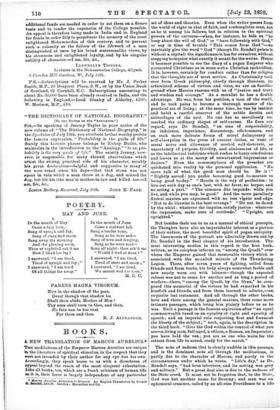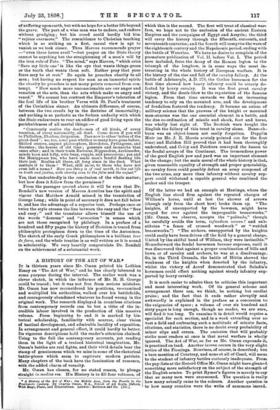BOOKS.
& NEW TRANSLATION OF MARCUS AURELIUS.*
Tan meditations of the Emperor Marcus Aurelius are unique in the literature of spiritual stimulus, in the respect that they were not intended by their author for any eye but his own. Accordingly, they speak home to us with a directness of appeal beyond the reach of the most eloquent exhortation. Like all books, too, which are a frank criticism of human life as it is, their force is largely independent of any particular • Marcus Aureliu, AntoninuA to Himself. An English Translation by Gerald B.Rimdall, Litt.D. Londoa 7, Macmillan and Co. set of ideas and theories. Even when the writer passes from the world of sight to that of faith, and contemplates man, not as he is among his fellows, but in relation to the spiritual powers of the universe—when, for instance, he bids us "be busy about the will of God," or "have fellowship with God," or say in time of trouble "This comes from God "—we inevitably give the word " God " (though Dr. Rendall prints it without a capital) the significance it has for ourselves, without stopping to inquire what exactly it meant for the writer. Hence it becomes possible to use the diary of a pagan Emperor who persecuted Christians as in some sort a Christian enchiridion. It is, however, certainly for conduct rather than for religion that the thoughts are of most service. As Christianity took over from Greek philosophy, chiefly through Stoicism, its articulated scheme of virtues and vices, we are on familiar ground when Marcus reasons with us of "justice and truth and wisdom and courage." As a moralist he has a double advantage. He was, from his position, a man of the world, and he took pains to become a thorough master of the practical art of living ; at the same time, he was by instinct and habit a careful observer of the subtle deceits and subterfuges of the soul. No one has so mercilessly un- masked the ordinary shapes of self-excuse. He fixes orr regard, says Dr. Rendall, "on sins of respectability, on indolence, impatience, discourtesy, officiousness, and on such more delicate forms of moral delinquency a& self-absorption in the press of current duties, as want of moral nerve and allowance of morbid self-distrusts, ail uncertainty of purpose, frivolity, and aimlessness of life, or as the intellectual indolence which rushes to hasty conclusions. and leaves 11E3 at the mercy of unwarranted impressions or desires." Even the commonplaces of the preacher are quickened into reality by the personal application. "No. more talk of what the good man should be. Be it !" "Rightly served : you prefer becoming good to-morrow to being good to-day." "Herein is the way of perfection : to live out each day as one's last, with no fever, no torpor, and no acting a part." "The common due impends: while you live, and while you may, be good." And the more peculiarly Stoical maxims are expressed with no less vigour and edge. "Not to do likewise is the best revenge." "Do not be dazed by the whirl: whatever the impulse, satisfy justice : whatever the impression, make sure of certitude." "Upright, no uprighted."
But besides their use to us as a manual of ethical precepts,. the Thoughts have also an imperishable interest as a picture. of their author, the most beautiful spirit of pagan antiquity. The lineaments of the portrait are admirably drawn out by Dr. Rendall in the final chapter of his introduction. The. most interesting section in this regard is the first book,. written, as its colophon informs us, "among the Quadi," over whom the Emperor gained that memorable victory which is. associated with the so-called miracle of the Thundering Legion. There, after seven years of fighting, exiled from friends and from books, his body always somewhat feeble and now nearly worn out with labours—though the expected, release was not to come for another and as long a period of warfare—there, "among the Quadi, by the Gran," he com- posed this memorial of the virtues he had remarked in hie. kinsfolk and friends, and from them learned to admire,—as exquisite last testament. And all through the other books,. here and there among the general maxims, there come more intimate passages, which bring him plainly before us as he was. Such a passage is the famous aspiration after "an equal commonwealth based on an equality of right and equality of speech ; and an imperial rule respecting first and foremost the liberty of the subject ; " such, again, is the description in the third book. "Give the God within the control of what your are—a living man, full-aged, a citizen, a Roman, an Imperator you have held the van ; you are as one who waits for thep retreat from life to sound, ready for the march."
The note of sadness that is clearly audible in this passage, and is the dominant note all through the meditations, is partly due to the character of Marcus, and partly to the circumstances under which he wrote. "Life's day," as Dr.. Rendall says, "had been laborious, and its setting was grey and solitary." But a great deal also is due to the sadness of' the Stoic creed. It must not be forgotten that, to the Stoic,. God was but another name for Destiny ; and man was aa ephemeral creature, called by an all-wise Providence to. a life)
of suffering upon earth, but with no hope for a better life beyond the grave. The part of a wise man was to endure, and endure without grudging ; but his creed could hardly bid him "rejoice evermore." The resemblance to Christian teaching which is so striking on a first, casual view is apt to vanish as we look closer. Thus Marcus recommends prayer —" even three hours avail "—but prayer on the Stoic theory cannot be anything but the straightening of a man's will by the iron rule of Fate. The mind," says Marcus, "which cries 'Save my little one' is like the eye that wants things green or the tooth that wants them soft. Rather pray that your fears may be at rest." So again he preaches charity to all men ; but having no respect for man as an immortal spirit, the charity he preaches is not many points removed from con- tempt. "How much more unconscionable are our anger and vexation at the acts, than the acts which make us angry and vexed." We cannot but contrast the Emperor's toleration of the foul life of his brother Verne with St. Paul's treatment of the Corinthian sinner. An ultimate difference, of course, between the two creeds lay in the doctrine of immortality; and nothing is so pathetic as the forlorn audacity with which the Stoic endeavours to rear an edifice of good living upon the perishableness of all mortal things :—
"Constantly realise the dead—men cf all kinds, of every vocation, of every nationality, all dead. Come dcwn if you will to Phil istion, Phcebus, Origanion. Pass now to other' tribes of the great dead ' : we, too, must pass whither so many have gone before. Skilled orators, august philosophers, Herodotus, Pythagoras, and Socrates ; the heroes of old time ; generals and monarchs that came after ; and in their train Eudolcus, Hipparchus, Archimedes, minds keen and lofty, wits busy, supple, and precocious ; yes and the Menippu sea too, who have made man's fateful fleeting life their jest. Realise all these, all long since in the dust. What matters it to them ? What, still more, to these who have not even left a name ? Here one thing is of real worth, to live out life in truth and justice, with charity even to the false and the unjust."
Yes, that undoubtedly is the conclusion of the whole matter ; but how does it follow from the premisses From the passages quoted above it will be seen that Dr. Rendall's new version of Marcus Aurelius has the spirit and vigour that Matthew Arnold missed in the translation of George Long ; while in point of accuracy it does not fall below it, and has the advantage of a superior text. Perhaps once or twice the style crosses the line between the easy and the "free and easy;" and the translator allows himself the use of the words "demean" and " avocation " in senses which are not those recognised by philology. In a preface of a hundred and fifty pages the history of Stoicism is traced from philosophic protoplasm down to the time of the Antonines. The sketch of the early Greek philosophers is a brilliant tour de force, and the whole treatise is as well written as it is sound in scholarship. We very heartily congratulate Dr. Rendall on the achievement of a substantial work.



































 Previous page
Previous page